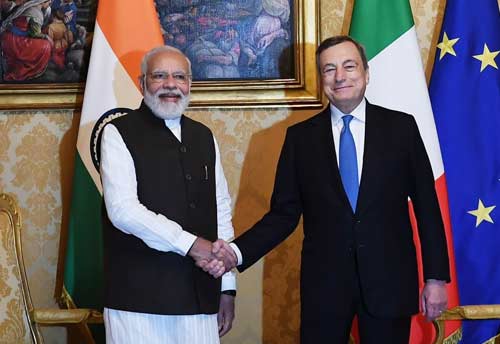Indian & Italian leaders to strengthen ties with renewable energy
Updated: Oct 30, 2021 11:41:19am

Indian & Italian leaders to strengthen ties with renewable energy
New Delhi, 30 Oct (KNN) On the sidelines of the G20 Leaders’ Summit hosted by Italy in Rome on October 30-31, 2021, Prime Minister Narendra Modi and Mario Draghi, President of the Council of Ministers of the Italian Republic had a bilateral meeting.
The two Leaders acknowledged significant progress in bilateral relations since the adoption of the Action Plan for an enhanced Partnership between India and Italy (2020 –2024) on November 6th, 2020.
They expressed their resolve to strengthen cooperation in the strategic sectors addressed by the Action Plan, including the cross-cutting issue of accelerating the clean energy transition to fight climate change, central to both the G20 Leaders Summit in Rome and the COP26 in Glasgow.
They also recalled the India-EU Leaders’ Meeting held in Porto on May 8, 2021, where the European Union and India highlighted the urgency of addressing the interdependent challenges of climate change, biodiversity loss and pollution and agreed to deepen cooperation for accelerating the deployment of renewable energy, including deployment of innovative renewable technologies such as offshore wind energy and exploiting the potential of green hydrogen, promoting energy efficiency, developing smart grids and storage technologies, modernizing the electricity market.
In addition, both sides agreed on the utmost importance of cost effective integration of a growing amount of renewable energy into their respective power systems, as a key asset for an effective clean transition that generates jobs, GDP growth, reinforces universal energy access while eradicating energy poverty.
In this perspective, the two Prime Ministers appreciated India’s resolve to deploy 450 GW of renewable energy by 2030 as well as Italy’s prompt ratification and active support to the International Solar Alliance, and agreed to launch a bilateral strategic partnership in the domain of energy transition.
Such a partnership could build on existing bilateral mechanisms, including by giving new impetus to the cooperation on renewable energy and sustainable development between the Italian Ministry of Ecological Transition and its Indian counterparts, namely the Ministry of New and Renewable Energy, the Ministry of Power and the Ministry of Petroleum and Natural Gas.
In order to promote their partnership in energy transition, India and Italy will task the "Joint Working Group” established by the Memorandum of Understanding on Cooperation in the field of Energy, signed in Delhi on October 30, 2017, to explore cooperation in areas such as: Smart Cities; mobility; smart-grids, electricity distribution and storage solutions; gas transportation and promoting natural gas as a bridge fuel; integrated waste management ("waste-to-wealth”); and green energies (green hydrogen; CNG & LNG; bio-methane; bio-refinery; second-generation bio-ethanol; castor oil; bio-oil –waste to fuel).
The two countries will initiate a dialogue to support the development and deployment of green hydrogen and related technologies in India, and consider working together to support a large size green corridor project in India to capitalize on India’s target to produce and integrate 450 GW of renewable energy by 2030.
They will also focus on encouraging Italian and Indian companies to develop joint projects in natural gas sector, technological innovation for decarbonisation, Smart Cities and other specific domains (i.e.: electrification of urban public transport).
Joint investments of Indian and Italian companies in energy transition-related fields will also be encouraged.
Share useful information and experiences especially in the field of policy and regulatory framework, including possible means to facilitate the transition to cleaner and commercially viable fuels/technologies, long-term grid planning, incentivizing schemes for renewables and efficiency measures, as well as with regard to financial instruments for accelerating clean energy transition.











